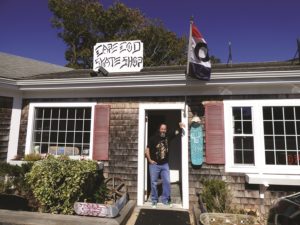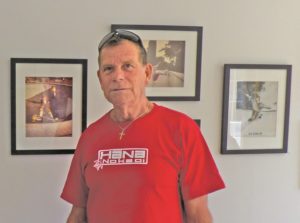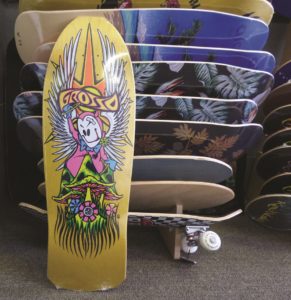WEST HARWICH — Wentzle Ruml has many stories to tell. In the 1970s, he was a member of the legendary Zephyr skateboarding team, known as the Z-Boys, in Santa Monica, Calif. He turned pro at age 18, surfing and skating professionally in Hawaii and California. He has also been a commercial fisherman in Wellfleet. And, as of August, he runs his own skate shop in West Harwich with his friend Tommy Wrenn.
“That guy has lived,” Wrenn says of Ruml’s life and career.
The Cape Cod Skate Shop, at 216 Main St., contains a trove of skating history. The shop has rare limited-edition decks and ads from the 1980s, and other tokens collected by Ruml. This past Saturday, Oct. 9, the shop became a gallery, hosting Wellfleet artist and skater Mike Page who curated a collection of old photographs of Ruml, taken in the 1970s during his Z-Boys days.

Beyond the memorabilia, the shop has all the equipment a skater needs — decks, bearings, wheels, trucks, etc. Ruml, who is now 63, and 50-year-old Wrenn both test all the products they sell in the shop. Wrenn said they can also build ramps and teach at-home lessons as well.
“This is a legit skate shop,” Ruml says.
It helps to be something of a legend. Because Ruml has connections to skaters across the country, he is able to get hard-to-find items for the shop.
Ruml started skating in the late 1960s, when most Americans had never even seen a skateboard. “I remember just getting on a board and doing some minor tricks,” he said. He joined the Z-Boys, which had been founded originally as a surf team, as a high schooler in the mid-1970s. He and 11 other skaters from Santa Monica reshaped the team, skating big hills, driveways, schoolyards — anyplace the clay wheels of their boards would take them.
There’s an industry built around skating equipment now, but looking back, Ruml says he and his friends got by using marginal gear.
“When urethane wheels came along, that changed everything,” he says. The new wheels didn’t rust as easily and maintained a better grip with the ground, allowing skaters to have more control over their movements.

When Southern California experienced a drought in the mid-’70s, many residents emptied their swimming pools to conserve water. The empty pools became playgrounds for the Z-Boys.
The group skated like they surfed. They stayed low to the ground, dragging their hands on the concrete as if they were touching a wave. When they skated to the lip of a ramp, they grabbed the top with one hand while another held the board before they rode back down. The Z-Boys are credited today with innovations in “vert skating” — vertical skateboarding — and in skate culture as a whole.
Their new style wasn’t universally well received when the team competed in the 1975 Del Mar Nationals, Ruml says.
“The judges had never seen what we were doing,” he says. “We didn’t even know what we were doing was possible. We invented that.”
The team dispersed not long after that 1975 competition, but their style changed skateboarding forever.
After Ruml left the team, he moved to Hawaii and was sponsored by Town & Country Surf Designs. Then, in 1976, he got an offer from California-based Makaha Skateboards to turn pro, and he moved back to the mainland.
By that point, skating’s popularity had exploded. Ruml made a lot of money at a young age, which, he admits, led to some bad decisions.
“When you’re 16, you’re not thinking about being 63,” says Mike Page.
It was around 1980 that Ruml moved from the West Coast to Truro in search of a slower life, he says. He had family here and got work as a commercial fisherman and carpenter. A few years ago, he decided he was ready to get back into the skating industry. This time, though, he wanted to be a shop owner.

“I’ve seen the skating scene die and re-emerge, or attempt to re-emerge out here,” Ruml says of skating on the Cape. Right now, there are lots of skaters in New England, he says. One reason is the pandemic. Moving outside, more kids began to pick up boards and ride, and adults who hadn’t touched a board in a while decided to take theirs out of the garage.
Ruml and Wrenn want to reach young skaters across the Cape and New England. They envision building an indoor park someday. Wrenn hopes the gallery can become a regular part of the skate shop. Skaters like to photograph and take video of other skaters, and the shop already has a working darkroom that photographers can use to process film.
This skate shop’s owners are not done having stories to tell.
